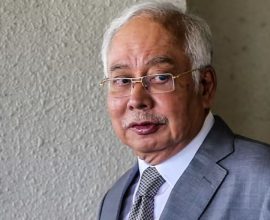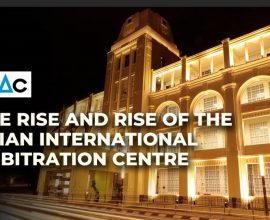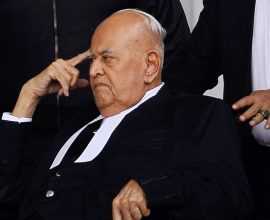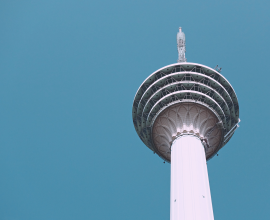Can the Cabinet revoke Emergency laws?
The answer is NO. To know more, read on…
[1] After much dithering, Parliament convened on 26 July 2021.
The proceedings were a circus. The Cabinet reminded me of the 1976 bout between Muhammad Ali and the Japanese wrestler Antonio Inoki. It was all highly publicised and very well-choreographed.
Inoki spent a large portion of his time on the canvas. Muhammad Ali left with sore calves. The world press called it ‘a farce’. Exactly what Parliamentary proceedings were on 26 July 2021.
During the debate, the Minister of Law startled everyone. He said, ‘The Cabinet had revoked the Emergency (Essential Powers) Ordinance 2021 on 21 July, 2021’.
He is of course wrong. Why?
There are 5 reasons why the Cabinet cannot revoke Emergency Laws.
[2] Then came another question. Let us get it out of the way. What is the difference between ‘Revocation’ and ‘Annulment’?
‘Revocation’ means ‘cancellation’. ‘Annulment’ means ‘making void’. ‘Annulment’ means something never really existed in law.
I will give you an example. If the government ‘revokes’ Mr A’s passport, from today, it means Mr A cannot use his passport for any international travel after today. Yet his passport was legal until yesterday; and all his travels are valid.
If the Government ‘annuls’ Mr B’s passport from today that means he never had a valid passport to start with.
[3] There are two other concepts you need to be aware of before you get trapped in the Government’s thickets of laws
Let us try to understand the difference between two other words. One is ‘Ordinance’. The other is ‘Act’.
An ‘Act is a law made by Parliament. An Ordinance is a law made by an inferior body, e.g., a Cabinet under the Emergency. That is why the Emergency Laws are called ‘Ordinances’. They are yet to be approved by Parliament. And that is why the constitution specifically refers to the ‘laying procedure’.
[4] So what is the ‘laying before Parliament Procedure’?
The basic point is, if the Government wishes to declare an Emergency, it must convince the King one of three ‘emergency conditions’ exist.
If the King is satisfied with the proof of these, the King then does three things: First His Majesty ‘Proclaims’ the Emergency. Then he ‘Promulgates’ laws. Then he asks Parliament to examine both to approve them.
The Proclamation of the Emergency, and any Emergency laws – called ‘ordinances’ – require parliamentary permission.
Parliament can either accept or reject them. The Constitution gives them that power. That power and procedure is called ‘the Laying Before Parliament procedure’. It is in Article 150(3).
His Majesty says so at the bottom of both the Proclamation and the Emergency Ordinance.
This is why the 1979 Privy Council case of Teh Cheng Poh stated that the limited powers of the King are those given to him by the Constitution. [Teh Cheng Poh v. Public Prosecutor [1979] 1 MLJ 50].
Having cleared that …
[5] The crucial question is, who can ‘revoke’ the proclamation or the Emergency laws made during the Emergency?
It is only Parliament.
Why? Let us go back to the Constitution.
Reason-1: Only Parliament can ‘make’, and ‘unmake’ the law. Article 44 of the Federal Constitution says so. It states:
‘The legislative authority of the Federation shall be vested in a Parliament.’
That is further clarified by Article 66 and 88.
So this is ‘Constitutional Law, 101’.
Reason-2: If Ordinances have the same power as a Parliamentary Act, only Parliament can revoke them?
Start with Article 150 (2C). It says the laws made,
‘under clause (2B) shall have the same force and effect as an act of Parliament …’
The Constitution says, if ‘the Emergency laws shall have the same effect as an Act of Parliament’. Only Parliament can make and unmake laws.
Reason-3:
We read Art. 150(2C) again. It says, an Emergency law, ‘promulgated under clause (2B) … shall continue in full force and effect… until it is revoked or annulled’ –
and then listen to the following words please –
‘under clause (3).
What does clause 3 say? It says,
‘…any Proclamation of Emergency and any Ordinance promulgated under clause (2B) shall be laid before both Houses of Parliament, and if not sooner revoked, shall cease to have effect if resolutions passed by both houses annulling such proclamation or ordinance…’
Reason-4: A law cannot be capriciously made, and capriciously revoked
The cabinet says it ‘revoked’ – presumably secretly – because all cabinet proceedings are secret — the Emergency laws on 21 July 2021.
Someone has erroneously advised the Cabinet the power of ‘revocation’ is with the Cabinet; and the power of ‘annulment’ is with both houses of parliament.
First, the Cabinet cannot make a law, and then decide to revoke it as and when they feel like it.
Why?
Because the Cabinet will make one law today: ‘All factories are to be classified as essential services’.
Tomorrow, they will say, ‘All factories are not essential services’.
Second, that is capricious. It destroys the economy. It makes the law unstable. And uncertain.
That is why the law requires both the Proclamation and the Emergency Laws to be laid before Parliament. Not hide it away and have it secretly revoked.
Reason-5: An Emergency law has three fates
Any Emergency law can suffer three fates.
- It can be ‘revoked’ [it was valid, but it is now cancelled], or
- It can be ‘annulled’ [‘It was never valid in the first place’] or
- It can die a natural death by a lapse of 6 months from the last day of the Emergency: [Art. 150(7)].
It has a constitutional ‘shelf life’ of 6 months from the last day of Emergency. So even if the Emergency is lifted on 01 August 2021, all Emergency Laws can carry on until 01 February 2022.
That is why Parliament needs to annul it. But that is another story for another day.
Reason-6: Article 150 does not give the Cabinet the power to ‘revoke’ any law
Can the Minister and the Cabinet show us such a clause? There is none.
Reason-7: The Gazette Point
This point is illustrated by a true story.
Lee Kim Hoong was arrested in 1969 during an Emergency, under the 1969 Emergency Laws.
His lawyer went to the Parliament Library to check whether that law had been ‘laid before Parliament’. He found no evidence.
So he argued that the Ordinance had not been ‘laid before parliament’. He said his client’s arrest was illegal. The prosecutor agreed.
Then the Secretary to Parliament proved that the 1969 Ordinance had, in fact, been approved by both houses.
The case ended up before the great legal luminary, Lord President, Tun Suffian. The case was Inspector General of Police and Another v. Lee Kim Hoong [1979] 2 MLJ 291 at page 293.
My friend, Mr. T. Gunaseelan reminded me of it.
The Lord President said:
‘One last thing. This case shows vividly the desirability of Gazetting the fact that the statutory instrument has been laid before Parliament.
How else is the public to know? Not many have the time or temerity to go and ask the people working in the office of Parliament.
In this case counsel for the applicant was sure it had not been laid, after a visit to the library of Parliament.
The learned Deputy Public Prosecutor in the lower court was also sure it had not been laid – else he would not have conceded.
The judge made the wrong decision because he relied on this concession.
If the laying had been Gazetted, then at least judges and lawyers would have known about it (assuming that the Gazette is properly and promptly indexed); and there would have been no need for Mr Pasupathy to visit Parliament House and no need for this appeal and no need for Encik Ghazali to swear an affidavit and no need for Encik Mohamed Noor to apply to adduce additional evidence.’
You can note the exasperation in Tun Suffian’s tone. No doubt you have the same feeling when the Minister spoke yesterday.
The Gazette is an archival document maintained by the authorities. Section 18 of the Interpretation Acts 1948 and 1967 states that all important decisions made by all three arms of the Government must be published in the Gazette.
Why is this important?
Suppose newspaper A states that the Cabinet had met on 21 July 2021, and had annulled seven of the 18 sections of the Emergency Ordinance. Suppose Newspaper B had, on the same day stated that out of the 23 sections, only 6 were revoked. This will create confusion.
When he firmly put his foot in his mouth yesterday, no doubt our intrepid Law Minister forgot what Lord President Suffian said in 1979. And he forgot all about Interpretation Acts.
[6] In conclusion
What on earth prompted the Minister of Law to argue that the Cabinet can take on the role of Parliament?
Isn’t this a breach of the separation of powers principle – one of the foundational doctrines of all modern and free governments, which practise the Rule of Law?
This reminds me of a case. Remember the Teoh Beng Hock Inquest on 18 August 2010?
Remember the way the MACC lawyer, Abdul Razak Musa, questioned the renowned Thai pathologist, Dr. Pornthip Rojanasunand?
Abdul Razak suggested that Teoh had strangled himself. Razak even gave a sound effect. And then Teoh rose and fell to his death.
Unable to bear this ridiculous line of questions, Dr. Rojanasunand eventually asked Razak:
‘Are you a lawyer?’
You might have felt the same way.
And so we can see that the Cabinet had a poor understanding of the fundamental constitutional concept in the law: that ‘legislative authority resides in parliament.
How can we allow these guys to run our Government?





